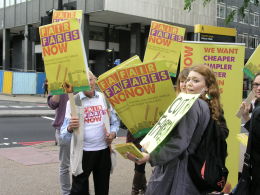Posted 17th August 2011 | 5 Comments
'Punitive' 8% fare rise is widely condemned

FARES on National Rail are to rise by an average of 8 per cent in England next January, following yesterday's announcement of the RPI in July, which decides the change. The government says the additional revenue is essential for railway investment and to reduce subsidies from taxpayers, but pressure groups are describing the increase as 'punitive'.
Protestors from pressure groups and unions staged a demonstration at Waterloo (pictured) just before July's RPI of 5 per cent was announced. They were accompanied by another group, Bring Back British Rail, which is calling for general renationalisation of the railways.
The Campaign for Better Transport has launched a petition opposing the rise of RPI + 3 per cent in England, which will apply for the next three years. The Scottish increase stays at the previous formula of RPI + 1 per cent, and no decision has yet been taken about increases for journeys wholly within Wales.
Some regulated fares in England could rise by as much as 13 per cent, because the government has restored the fares 'flex', which allows operators to impose greater increases for specific journeys so long as other fares are adjusted to maintain the average.
The Campaign's chief executive Stephen Joseph told Railnews: "Clearly, some of the investment in the railways should come from farepayers, and I don't think they would object if they were seeing real investment.
"What we are seeing, though, are very large rises which will feed back into government coffers. They won't necessarily go to investment. We think the real answer is the reductions in costs that McNulty started to talk about, and also other sources of revenue. Other countries use property taxes, and we've seen Crossrail partly financed by that. We want to see that kind of experience looked at more generally."
The unions are also opposing the increases, with Bob Crow of the RMT describing privatisation as 'robbery'.
The RMT has published new research which claims that privatisation has 'bled' £6.6 billion out of the industry since 1997 - with a forecast that a further £6.7 billion would also be paid to shareholders in the next ten years.
The union commissioned the research from Just Economics, which calculated that profits and fragmentation costs were £883 million in 2009 alone, and more than £6.6 billion between 1997 and 2009.
Mr Crow added: "RMT calculate that this would equate to an annual 10 per cent cut in rail fares or free bus and rail travel for all children under the age of 16. Instead, McNulty and the government are forcing through inflation busting fare increases and savage cuts to maximise private train company profits. The whole policy of rail privatisation is exposed as an economic and social disaster.”
However, the Association of Train Operating Companies said the decision had been a matter for the government. David Mapp, who is commercial director at ATOC, said: “We know that these are difficult financial times for many people. The government has decided that many fares need to rise above inflation for the next three years to help pay for more trains, better stations and faster services.
"Increasing the money raised from fares will mean that taxpayers contribute less to the running of the railways, whilst ensuring that vital investment can continue. All additional money raised through the change to RPI+3 will go straight back to the government.
"The industry is working with the Government to cut the cost of running the railways, building on the progress that has already been made. A more efficient railway will help to limit fare rises in the future."
Reader Comments:
Views expressed in submitted comments are that of the author, and not necessarily shared by Railnews.

Paul Gill, London, UK
Cut the number of people traveling for free that is paid for by the local council and make them pay for their travel. Then maybe our council tax would go down.
Joel Kosminsky, London, Britain
Rail fares up by RPI-basis, wages and pensions up (if at all) by CPI-basis - food and energy prices up by any other basis. You do the sums...
Melvyn Windebank, Canvey Island, Essex, England
It was reported that the additional 2% rail users will pay (RPI +3% instead of +1%) will go to the Government which sounds like a Stealth Tax on rail users. So what guarantee is there that ths money wont be used to subsidise road users even more given the way they still enjoy a free ride?
Surely its time the Highways Agency had the same set-up as Network Rail and had to generate income to the same percentage as Network Rail to build and maintain M-Ways and major A roads.
Its also worth remembering that 5% is due to inflation way above the 2% target and so rail users are paying the price of this Tory Lead Government while savers have seen no rise in interest rates to stem this inflation!!
Thomas Allen, albufeira, portugal
Be grateful it's only 8%. Where I live, Portugal, most rail fares were increased by 15% on 1st August and at just one week's notice.
Tony Pearce, Reading, UK
Maybe the Government has to save £2 billion a year from subsidising fares so that it can spend it on building the new High Speed 2 railway ?
Over 70% of railway costs are paying wages and salaries.
The RMT has been very clever at getting above inflation settlements all through the recession which basically has to paid for by the rail traveller or taxpayer.
Is it fair that the Taxpayer subsidies rail travel other than on rural lines that are socially necessary ?
All other forms of transport (rail and air) contribute large amounts in Taxation to HMG and their costs have also risen dramatically in the last 2 years.